2019年6月英语四级听力原文+答案:试卷一长对话(沪江网校)_沪江英语学习网
2019年6月英语四级听力真题长对话原文
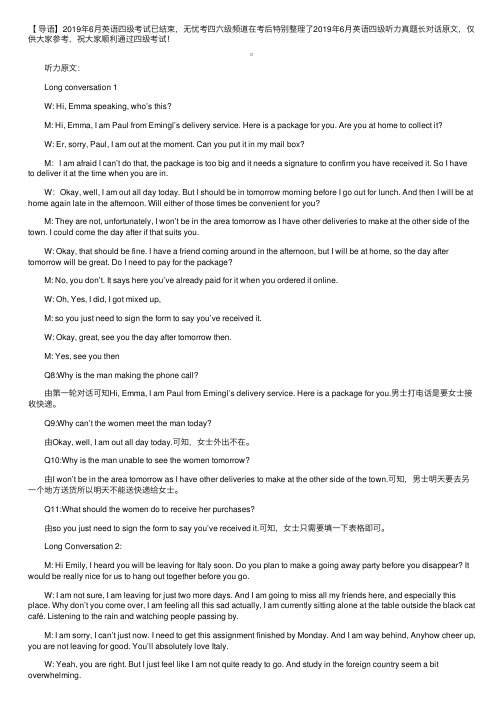
【导语】2019年6⽉英语四级考试已结束,⽆忧考四六级频道在考后特别整理了2019年6⽉英语四级听⼒真题长对话原⽂,仅供⼤家参考,祝⼤家顺利通过四级考试! 听⼒原⽂: Long conversation 1 W: Hi, Emma speaking, who’s this? M: Hi, Emma, I am Paul from Emingl’s delivery service. Here is a package for you. Are you at home to collect it? W: Er, sorry, Paul, I am out at the moment. Can you put it in my mail box? M:I am afraid I can’t do that, the package is too big and it needs a signature to confirm you have received it. So I have to deliver it at the time when you are in. W:Okay, well, I am out all day today. But I should be in tomorrow morning before I go out for lunch. And then I will be at home again late in the afternoon. Will either of those times be convenient for you? M: They are not, unfortunately, I won’t be in the area tomorrow as I have other deliveries to make at the other side of the town. I could come the day after if that suits you. W: Okay, that should be fine. I have a friend coming around in the afternoon, but I will be at home, so the day after tomorrow will be great. Do I need to pay for the package? M: No, you don’t. It says here you’ve already paid for it when you ordered it online. W: Oh, Yes, I did, I got mixed up, M: so you just need to sign the form to say you’ve received it. W: Okay, great, see you the day after tomorrow then. M: Yes, see you then Q8:Why is the man making the phone call? 由第⼀轮对话可知Hi, Emma, I am Paul from Emingl’s delivery service. Here is a package for you.男⼠打电话是要⼥⼠接收快递。
2019年6月英语四级听力原文:试卷一长对话(文都教育)_沪江英语学习网
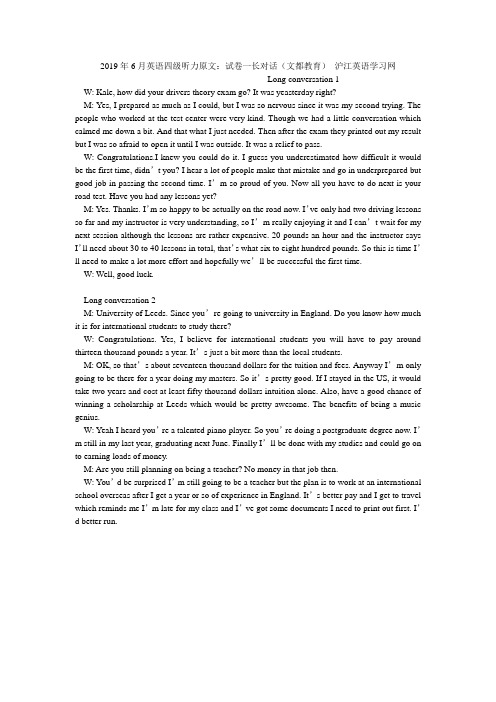
2019年6月英语四级听力原文:试卷一长对话(文都教育)_沪江英语学习网Long conversation 1W: Kale, how did your drivers theory exam go? It was yeasterday right?M: Yes, I prepared as much as I could, but I was so nervous since it was my second trying. The people who worked at the test center were very kind. Though we had a little conversation which calmed me down a bit. And that what I just needed. Then after the exam they printed out my result but I was so afraid to open it until I was outside. It was a relief to pass.W: Congratulations.I knew you could do it. I guess you underestimated how difficult it would be the first time, didn’t you? I hear a lot of people make that mistake and go in underprepared but good job in passing the second time. I’m so proud of you. Now all you have to do next is your road test. Have you had any lessons yet?M: Yes. Thanks. I’m so happy to be actually on the road now. I’ve only had two driving lessons so far and my instructor is very understanding, so I’m really enjoying it and I can’t wait for my next session although the lessons are rather expensive. 20 pounds an hour and the instructor says I’ll need about 30 to 40 lessons in total, that’s what six to eight hundred pounds. So this is time I’ll need to make a lot more effort and hopefully we’ll be successful the first time.W: Well, good luck.Long conversation 2M: University of Leeds. Since you’re going to university in England. Do you know how much it is for international students to study there?W: Congratulations. Yes, I believe for international students you will have to pay around thirteen thousand pounds a year. It’s just a bit more than the local students.M: OK, so that’s about seventeen thousand dollars for the tuition and fees. Anyway I’m only going to be there for a year doing my masters. So it’s pretty good. If I stayed in the US, it would take two years and cost at least fifty thousand dollars intuition alone. Also, have a good chance of winning a scholarship at Leeds which would be pretty awesome. The benefits of being a music genius.W: Yeah I heard you’re a talented piano player. So you’re doing a postgraduate degree now. I’m still in my last year, graduating next June. Finally I’ll be done with my studies and could go on to earning loads of money.M: Are you still planning on being a teacher? No money in that job then.W: You’d be surprised I’m still going to be a teacher but the plan is to work at an international school overseas after I get a year or so of experience in England. It’s better pay and I get to travel which reminds me I’m late for my class and I’ve got some documents I need to print out first. I’d better run.。
2019年6月四级真题第一套附答案及听力材料

2019年6月四级真题(第一套)答案附后面Part I WritingDirections: For this part, you are allowed 30 minutes to write a news report to your campus newspaper on a visit to a local farm organized by your Student Union. You should write at least 120 words but no more than 180 words.Part II Listening ComprehensionSection ADirections: In this section, you will hear three news reports. At the end of each news report, you will hear two or three questions. Both the news report and the questions will be spoken only once. After you hear a question, you must choose the best answer from the four choices marked A), B), C) and D). Then mark the corresponding letter on Answer Sheet 1 with a single line through the centre.Questions 1 and 2 are based on the news report you have just heard.1.A) He set a record by swimming to and from an island.B) He celebrated ninth birthday on a small island.C) He visited a prison located on a faraway island.D) He swam around an island near San Francisco.2.A) He doubled the reward.B) He set him an example.C) He cheered him on all the way.D) He had the event covered on TV.Questions 3 and 4 are based on the news report you have just heard.3.A) To end the one-child policy.B) To encourage late marriage.C) To increase working efficiency.D) To give people more time to travel.4.A) They will not be welcomed by young people.B) They will help to popularize early marriage.C) They will boost China’s economic growth.D) They will not come into immediate effect.Questions 5 to 7 are based on the news report you have just heard.5.A) Cleaning service in great demand all over the world.B) Two ladies giving up well-paid jobs to do cleaning.C) A new company to clean up the mess after parties.D) Cleaners gainfully employed at nights and weekends.6.A) It takes a lot of time to prepare.B) It leaves the house in a mess.C) It makes party goers exhausted.D) It creates noise and misconduct.7.A) Hire an Australian lawyer.B) Visit the U.S. and Canada.C) Settle a legal dispute.D) Expand their business.Section BDirections: In this section, you will hear two long conversations. At the end of each conversation, you will hear four questions. Both the conversation and the questions will be spoken only once. After you hear a question, you must choose the best answer from the four choices marked A), B), C) and D). Then mark the corresponding letter on Answer Sheet 1 with a single line through the centre.Questions 8 to 11 are based on the conversation you have just heard.8.A) He had a driving lesson.B) He got his driver’s license.C) He took the driver’s theory exam.D) He passed the driver’s road test.9.A) He was not well prepared.B) He did not get to the exam in time.C) He was not used to the test format.D) He did not follow the test procedure.10.A) They are tough.B) They are costly.C) They are helpful.D) They are too short.11.A) Pass his road test the first time.B) Test-drive a few times on highways.C) Find an experienced driving instructor.D) Earn enough money for driving lessons.Questions 12 to 15 are based on the conversation you have just heard.12.A) Where the woman studies.B) The acceptance rate at Leeds.C) Leeds’ tuition for international students.D) How to apply for studies at a university.13.A) Apply to an American university.B) Do research on higher education.C) Perform in a famous musical.D) Pursue postgraduate studies.14.A) His favorable recommendations.B) His outstanding musical talent.C) His academic excellence.D) His unique experience.15.A) Do a master’s degree.B) Settle down in England.C) Travel widely.D) Teach overseas.Section CDirections: In this section, you will hear three passages. At the end of each passage, you will hear three or four questions. Both the passage and the questions will be spoken only once. After you hear a question, you must choose the best answer from the four choices marked A), B), C) and D). Then mark the corresponding letter on Answer Sheet 1 with a single line through the centre.Questions 16 to 18 are based on the passage you have just heard.16.A) They help farmers keep diseases in check.B) Many species remain unknown to scientists.C) Only a few species cause trouble to humans.D) They live in incredibly well-organized colonies.17.A) They are larger than many other species.B) They can cause damage to people’s homes.C) They can survive a long time without water.D) They like to form colonies in electrical units.18.A) Deny them access to any food.B) Keep doors and windows shut.C) Destroy their colonies close by.D) Refrain from eating sugary food.Questions 19 to 21 are based on the passage you have just heard.19.A) The function of the human immune system.B) The cause of various auto-immune diseases.C) The viruses that may infect the human immune system.D) The change in people’s immune system as they get older.20.A) Report their illnesses.B) Offer blood samples.C) Act as research assistants.D) Help to interview patients.21.A) Strengthening people’s immunity to infection.B) Better understanding patients’ immune system.C) Helping improve old people’s health conditions.D) Further reducing old patients’ medical expenses.Questions 22 to 25 are based on the passage you have just heard.22.A) His students had trouble getting on with each other.B) A lot of kids stayed at school to do their homework.C) His students were struggling to follow his lessons.D) A group of kids were playing chess after school.23.A) Visit a chess team in Nashville.B) Join the school’s chess te am.C) Participate in a national chess competition.D) Receive training for a chess competition.24.A) Most of them come from low-income families.B) Many have become national chess champions.C) A couple of them have got involved in crimes.D) Many became chess coaches after graduation.25.A) Actions speak louder than words.B) Think twice before taking action.C) Translate their words into action.D) Take action before it gets too late.Part III Reading ComprehensionSection ADirections: In this section, there is a passage with ten blanks. You are required to select one word for each blank from a list of choices given in a word bank following the passage. Read the passage through carefully before making your choices. Each choice in the bank is identified by a letter. Please mark the corresponding letter for each item on Answer Sheet 2 with a single line through the centre. You may not use any of the words in the bank more than once.The center of American automobile innovation has in the past decade moved 2,000 miles away. It has 26 from Detroit to Silicon Valley, where self-driving vehicles are coming to life.In a 27 to take production back to Detroit, Michigan lawmakers have introduced 28 that could make their state the best place in the country, if not the world, to develop self-driving vehicles and put them on the road.“Michigan’s 29 in auto research and development is under attack from several states and countries who desire to 30 our leadership in transportation. We can’t let that happen,” says Senator Mike Kowall, the lead 31 of four bills recently introduced.If all four bills pass as written, they would 32 a substantial update of Michigan’s 2013 law that allowed the testing of self-driving vehicles in limited conditions. Manufacturers would have nearly total freedom to test their self-driving technology on public roads. They would be allowed to send groups of self-driving cars on cross-state road trips, and even set up on-demand 33 of self-driving cars, like the one General Motors and Lyft are building.Lawmakers in Michigan clearly want to make the state ready for the commercial application of self-driving technology. In 34 , California, home of Silicon Valley, recently proposed far more 35 rules that would require human drivers be ready to take the wheel, and ban commercial use of self-driving technology.A) bidB) contrastC) deputyD) dominanceE) fleetsF) knotsG) legislationH) migrated I) replaceJ) represent K) restrictive L) reward M) significant N) sponsor O) transmittedSection BDirections: In this section, you are going to read a passage with ten statements attached to it. Each statement contains information given in one of the paragraphs. Identify the paragraph from which the information is derived. You may choose a paragraph more than once. Each paragraph is marked with a letter. Answer the questions by marking the corresponding letter on Answer Sheet 2.How Work Will Change WhenMost of Us Live to 100A) Today in the United States there are 72,000 centenarians (百岁老人). Worldwide, probably 450,000. If current trends continue, then by 2050 there will be more than a million in the US alone. According to the work of Professor James Vaupel and his co-researchers, 50% of babies born inthe US in 2007 have a life expectancy of 104 or more. Broadly the same holds for the UK, Germany, France, Italy and Canada, and for Japan 50% of 2007 babies can expect to live to 107.B) Understandably, there are concerns about what this means for public finances given the associated health and pension challenges. These challenges are real, and society urgently needs to address them. But it is also important to look at the wider picture of what happens when so many people live for 100 years. It is a mistake to simply equate longevity (长寿) with issues of old age. Longer lives have implications for all of life, not just the end of it.C) Our view is that if many people are living for longer, and are healthier for longer, then this will result in an inevitable redesign of work and life. When people live longer, they are not only older for longer, but also younger for longer. There is some truth in the saying that “70 is the new 60” or “40 the new 30”. If you age more slowly over a longer time period, then you are in some sense younger for longer.D) But the changes go further than that. Take, for instance, the age at which people make commitments such as buying a house, getting married, having children, or starting a career. These are all fundamental commitments that are now occurring later in life. In 1962, 50% of Americans were married by age 21. By 2014, that milestone (里程碑) had shifted to age 29.E) While there are numerous factors behind these shifts, one factor is surely a growing realization for the young that they are going to live longer. Options are more valuable the longer they can be held. So if you believe you will live longer, then options become more valuable, and early commitment becomes less attractive. The result is that the commitments that previously characterized the beginning of adulthood are now being delayed, and new patterns of behavior and a new stage of life are emerging for those in their twenties.F) Longevity also pushes back the age of retirement, and not only for financial reasons. Yes, unless people are prepared to save a lot more, our calculations suggest that if you are now in your mid-40s, then you are likely to work until your early 70s; and if you are in your early 20s, there is a real chance you will need to work until your late 70s or possibly even into your 80s. But even if people are able to economically support a retirement at 65, over thirty years of potential inactivity is harmful to cognitive (认知的) and emotional vitality. Many people may simply not want to do it.G) And yet that does not mean that simply extending our careers is appealing. Just lengthening that second stage of full-time work may secure the financial assets needed for a 100-year life, but such persistent work will inevitably exhaust precious intangible assets such as productive skills, vitality, happiness, and friendship.H) The same is true for education. It is impossible that a single shot of education, administered in childhood and early adulthood, will be able to support a sustained, 60-year career. If you factor in the projected rates of technological change, either your skills will become unnecessary, or your industry outdated. That means that everyone will, at some point in their life, have to make a number of major reinvestments in their skills.I) It seems likely, then, that the traditional three-stage life will evolve into multiple stages containing two, three, or oven more different careers. Each of these stages could potentially bedifferent. In one the focus could be on building financial success and personal achievement, in another on creating a better work/life balance, still another on exploring and understanding options more fully, or becoming an independent producer, yet another on making a social contribution. These stages will span sectors, take people to different cities, and provide Foundation for building a wide variety of skills.J) Transitions between stages could be marked with sabbaticals (休假) as people find time to rest and recharge their health, re-invest in their relationships, or improve their skills. At times, these breaks and transitions will be self-determined, at others they will be forced as existing roles, firms, or industries cease to exist.K) A multi-stage life will have profound changes not just in how you manage your career, but also in your approach to life. An increasingly important skill will be your ability to deal with change and even welcome it. A three-stage life has few transitions, while a multi-stage life has many. That is why being self-aware, investing in broader networks of friends, and being open to new ideas will become even more crucial skills.L) These multi-stage lives will create extraordinary variety across groups of people simply because there are so many ways of sequencing the stages. More stages mean more possible sequences.M) With this variety will come the end of the close association of age and stage. In a three-stage life, people leave university at the same time and the same age, they tend to start their careers and family at the same age, they proceed through middle management all roughly the same time, and then move into retirement within a few years of each other. In a multi-stage life, you could be an undergraduate at 20, 40, or 60; a manager at 30, 50, or 70; and become an independent producer at any age.N) Current life structures, career paths, educational choices, and social norms are out of tune with the emerging reality of longer lifespans. The three-stage life of full-time education, followed by continuous work, and then complete retirement may have worked for our parents or even grandparents, but it is not relevant today. We believe that to focus on longevity as primarily an issue of aging is to miss its full implications. Longevity is not necessarily about being older for longer. It is about living longer, being older later, and being younger longer.36. An extended lifespan in the future will allow people to have more careers than now.37. Just extending one’s career may have both positive and negative effects.38. Nowadays, many Americans have on average delayed their marriage by some eight years.39. Because of their longer lifespan, young people today no longer follow the pattern of life of their parents or grandparents.40. Many more people will be expected to live over 100 by the mid-21st century.41. A longer life will cause radical changes in people’s approach to life.42. Fast technological change makes it necessary for one to constantly upgrade their skills.43. Many people may not want to retire early because it would do harm to their mental and emotional well-being.44. The close link between age and stage may cease to exist in a multi-stage life.45. People living a longer and healthier life will have to rearrange their work and life.Section CDirections: There are 2 passages in this section. Each passage is followed by some questions or unfinished statements. For each of them there are four choices marked A), B), C) and D). You should decide on the best choice and mark the corresponding letter on Answer Sheet 2 with a single line through the centre.Passage OneQuestions 46 to 50 are based on the following passage.In the classic marriage vow (誓约), couples promise to stay together in sickness and in health. But a new study finds that the risk of divorce among older couples rises when the wife – not the husband – becomes seriously ill.“Married women diagnosed with a serious health condition may find themselves struggling with the impact of their disease while also experiencing the stress of divorce”, said researched Amelia Karraker.Karraker and co-author Kenzie Latham analyzed 20 years of date on 2,717 marriages from a study conducted by Indiana University since 1992. At the time of the first interview, at least oneof the partners was over the age of 50.The researchers examined how the onset (发生) of four serious physical illnesses affected marriages. They found that, overall, 31% of marriages ended in divorce over the period studied. The incidence of new chronic (慢性的) illness onset increased over time as well, with more husbands than wives developing serious health problems.“We found that women are doubly vulnerable to marital break-up in the face of illness,” Karraker said. “They’re more likely to be widowed, and if they’re the ones who become ill, they’re more likely get divorced.”While the study didn’t assess why divorce is more likely when wives but not husbands become seriously ill, Karraker offers a few possible reasons. “Gender norms and social expectations about caregiving may make it more difficult for men to provide ca re to sick spouses,” Karraker said. “And because of the imbalance in marriage markets, especially in older ages, divorced men have more choices among prospective partners than divorced women.”Given the increasing concern about health care costs for the aging population, Karraker believes policymakers should be aware of the relationship between disease and risk of divorce.“Offering support services to spouses caring for their other halves may reduce martial stress and prevent divorce at older ages,” she said. “But it’s also important to recognize that the pressure to divorce may be health-related and that sick ex-wives may need additional care and services to prevent worsening health and increased health costs.”46. What can we learn about marriage vows from the passage?A) They may not guarantee a lasting marriage.B) They are as binding as they used to be.C) They are not taken seriously any more.D) They may help couples tide over hard times.47. What did Karraker and co-author Kenzie Latham find about elderly husbands?A) They are generally not good at taking care of themselves.B) They can become increasingly vulnerable to serious illness.C) They can develop different kinds of illness just like their wives.D) They are more likely to contract serious illness than their wives.48. What does Karraker say about women who fall ill?A) They are more likely to be widowed.B) They are more likely to get divorced.C) They are less likely to receive good care.D) They are less likely to bother their spouses.49. Why is it more difficult for men to take care of their sick spouses according to Karraker?A) They are more accustomed to receiving care.B) They find it more important to make money for the family.C) They think it more urgent to fulfill their social obligations.D) They expect society to do more of the job.50. What does Karraker think is also important?A) Reducing marital stress on wives.B) Stabilizing old couples’ relations.C) Providing extra care for divorced women.D) Making men pay for their wive s’ health costs.Passage TwoQuestions 51 to 55 are based on the following passage.If you were like most children, you probably got upset when your mother called you by a sibling’s (兄弟姐妹的) name. How could she not know you? Did it mean she loved you less?Probably not. According to the first research to tackle this topic head-on, misnaming the most familiar people in our life is a common cognitive (认知的) error that has to do with how our memories classify and store familiar names.The study, published online in April in the journal Memory and Cognition, found that the “wrong” name is not random but is invariably fished out from the same relationship pond: children, siblings, friends. The study did not examine the possibility of deep psychological significanc e to the mistake, says psychologist David Rubin, “but it does tell us who’s in and who’s out of the group.”The study also found that within that group, misnamings occurred where the names shared initial or internal sounds, like Jimmy and Joanie or John and Bob. Physical resemblance between people was not a factor. Nor was gender.The researchers conducted five separate surveys of more than 1,700 people. Some of the surveys included only college students; others were done with a mixed-age population. Some asked subjects about incidents where someone close to them – family or friend – had called them by another person’s name. The other surveys asked about times when subjects had themselves called someone close to them by the wrong name. All the surveys found that people mixed up names within relationship groups such as grandchildren, friends and siblings but hardly ever crossed these boundaries.In general, the study found that undergraduates were almost as likely as old people to make this mistake and men as likely as women. Older people and women made the mistake slightly more often, but that may be because grandparents have more grandchildren to mix up than parents have children. Also, mothers may call on their children more often than fathers, given traditional gender norms. There was no evidence that errors occurred more when the misnamer was frustrated, tired or angry.51. How might people often feel when they were misnamed?A) Unwanted.B) Unhappy.C) Confused.D) Indifferent.52. What did David Rubin’s research find about misnaming?A) It is related to the way our memories work.B) It is a possible indicator of a faulty memory.C) It occurs mostly between kids and their friends.D) It often causes misunderstandings among people.53. What is most likely the cause of misnaming?A) Similar personality traits.B) Similar spellings of names.C) Similar physical appearance.D) Similar pronunciation of names.54. What did the surveys of more than 1,700 subjects find about misnaming?A) It more often than not hurts relationships.B) It hardly occurs across gender boundaries.C) It is most frequently found in extended families.D) It most often occurs within a relationship group.55. Why do mothers misname their children more often than fathers?A) They suffer more frustrations.B) They become worn out more often.C) They communicate more with their children.D) They generally take on more work at home.Part IV TranslationDirections: For this part, you are allowed 30 minutes to translate a passage from Chinese into English. You should write your answer on Answer Sheet 2.舞狮作为中国传统民间表演已有2000多年历史。
2019年6月英语四级听力答案解析:试卷一短篇新闻1(沪江网校)_沪江英语学习网
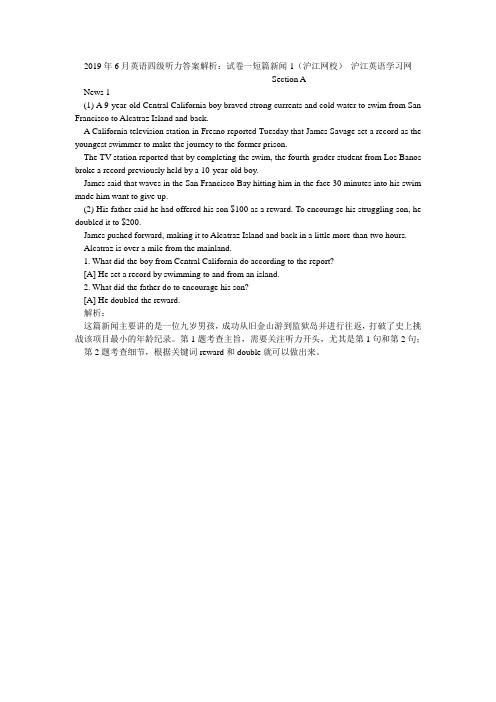
2019年6月英语四级听力答案解析:试卷一短篇新闻1(沪江网校)_沪江英语学习网Section ANews 1(1) A 9-year-old Central California boy braved strong currents and cold water to swim from San Francisco to Alcatraz Island and back.A California television station in Fresno reported Tuesday that James Savage set a record as the youngest swimmer to make the journey to the former prison.The TV station reported that by completing the swim, the fourth-grader student from Los Banos broke a record previously held by a 10-year-old boy.James said that waves in the San Francisco Bay hitting him in the face 30 minutes into his swim made him want to give up.(2) His father said he had offered his son $100 as a reward. To encourage his struggling son, he doubled it to $200.James pushed forward, making it to Alcatraz Island and back in a little more than two hours. Alcatraz is over a mile from the mainland.1. What did the boy from Central California do according to the report?[A] He set a record by swimming to and from an island.2. What did the father do to encourage his son?[A] He doubled the reward.解析:这篇新闻主要讲的是一位九岁男孩,成功从旧金山游到监狱岛并进行往返,打破了史上挑战该项目最小的年龄纪录。
2019年6月大学英语四级考试真题及参考答案

2019年6月大学英语四级考试真题及参考答案第3套Part I Writing (30 minutes)Directions: For this part, you are allowed 30 minutes to write a news report to your campus newspaper on a visit to a Hope elementary school organized by your Student Union.. You should write at least 120 words but no more than 180 words.【参考范文】On the morning of June 1st, a group of volunteers from our university’s Student Union paid a visit to a Hope Primary School to help the children there have a happy Children’s Day.We arrived at this school at nine in the morning and the children welcomed us warmly. This volunteer activity mainly include three parts. In the first place, we introduced ourselves briefly, which helped us to know each other better. Additionally, we organized some recreational activities. For example, our talented volunteers taught those children to dance and sing. In the end, we gave the stationery prepared in advance to these lovely children.This volunteer activity was really impressive. It gave us an opportunity to experiencea different life and we were really moved by the children’s enthusiasm.【参考译文】6月1日上午我校学生会的部分志愿者参观了一所希望小学。
2019年6月英语四级真题参考答案第一套(卷一)
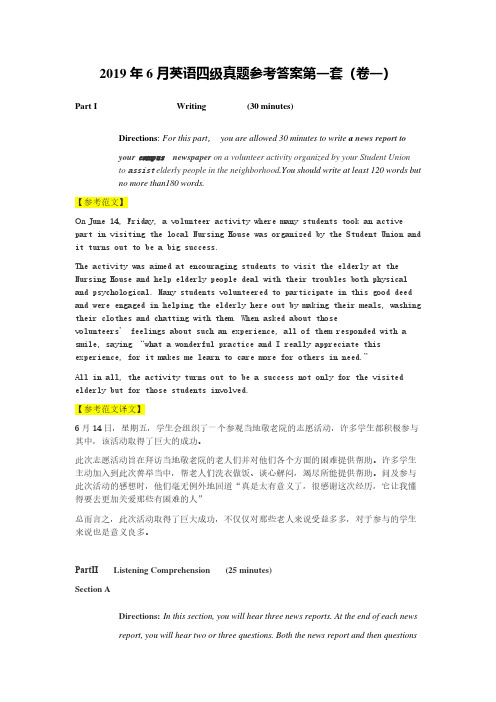
2019年6月英语四级真题参考答案第一套(卷一)Part I Writing (30 minutes)Directions:For this part, you are allowed 30 minutes to write a news report toyour campus newspaper on a volunteer activity organized by your Student Unionto assist elderly people in the neighborhood.You should write at least 120 words butno more than180 words.【参考范文】On June 14, Friday, a volunteer activity where many students took an active part in visiting the local Nursing House was organized by the Student Union and it turns out to be a big success.The activity was aimed at encouraging students to visit the elderly at the Nursing House and help elderly people deal with their troubles both physical and psychological. Many students volunteered to participate in this good deed and were engaged in helping the elderly here out by making their meals, washing their clothes and chatting with them. When asked about thosevolunteers’feelings about such an experience, all of them responded with a smile, saying “what a wonderful practice and I really appreciate this experience, for it makes me learn to care more for others in need.”All in all, the activity turns out to be a success not only for the visited elderly but for those students involved.【参考范文译文】6月14日,星期五,学生会组织了一个参观当地敬老院的志愿活动,许多学生都积极参与其中,该活动取得了巨大的成功。
2019年6月大学英语四级真题试卷(一)含答案和解析
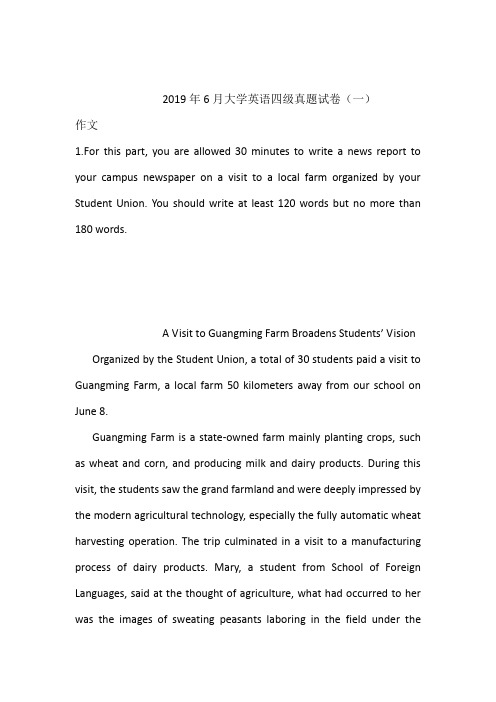
2019年6月大学英语四级真题试卷(一)作文1.For this part, you are allowed 30 minutes to write a news report to your campus newspaper on a visit to a local farm organized by your Student Union. You should write at least 120 words but no more than 180 words.A Visit to Guangming Farm Broadens Students’ VisionOrganized by the Student Union, a total of 30 students paid a visit to Guangming Farm, a local farm 50 kilometers away from our school on June 8.Guangming Farm is a state-owned farm mainly planting crops, such as wheat and corn, and producing milk and dairy products. During this visit, the students saw the grand farmland and were deeply impressed by the modern agricultural technology, especially the fully automatic wheat harvesting operation. The trip culminated in a visit to a manufacturing process of dairy products. Mary, a student from School of Foreign Languages, said at the thought of agriculture, what had occurred to her was the images of sweating peasants laboring in the field under thescorching sun. However, this trip totally changed her stereotype on Chinese agriculture.Through their personal experience, the field trip deepens college students’ understanding of the rapid social development, and will exert an ever-lasting influence upon their future study and work.解析:本次四级考试要求写新闻报道,着实让不少考生感到意外,但是细细想来,近几年应用文的趋势已经非常明显,大家应该在备考中做到“面上铺开,重点突出”。
2019年6月英语四级听力真题【已公布】
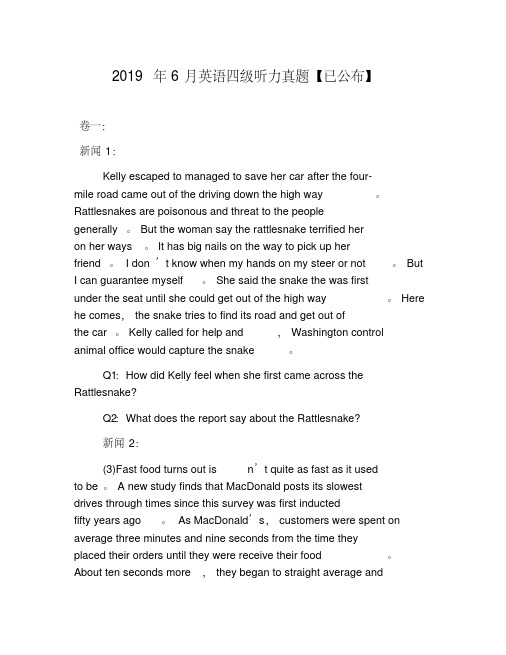
2019年6月英语四级听力真题【已公布】卷一:新闻1:Kelly escaped to managed to save her car after the four-mile road came out of the driving down the high way 。
Rattlesnakes are poisonous and threat to the peoplegenerally。
But the woman say the rattlesnake terrified heron her ways 。
It has big nails on the way to pick up herfriend。
I don’t know when my hands on my steer or not。
But I can guarantee myself。
She said the snake the was firstunder the seat until she could get out of the high way。
Here he comes, the snake tries to find its road and get out ofthe car。
Kelly called for help and, Washington controlanimal office would capture the snake。
Q1:How did Kelly feel when she first came across the Rattlesnake?Q2:What does the report say about the Rattlesnake?新闻2:(3)Fast food turns out is n’t quite as fast as it usedto be。
A new study finds that MacDonald posts its slowestdrives through times since this survey was first inductedfifty years ago。
- 1、下载文档前请自行甄别文档内容的完整性,平台不提供额外的编辑、内容补充、找答案等附加服务。
- 2、"仅部分预览"的文档,不可在线预览部分如存在完整性等问题,可反馈申请退款(可完整预览的文档不适用该条件!)。
- 3、如文档侵犯您的权益,请联系客服反馈,我们会尽快为您处理(人工客服工作时间:9:00-18:30)。
2019年6月英语四级听力原文+答案:试卷一长对话(沪江网校)_沪江英语学习网
Section B
Conversation 1
W: Kyle, how did your (8) driver’s theory exam go? It was yesterday, right?
M: Yes, I prepared it as much as I could, but I was so nervous since it was my second try. The people who worked at the test center were very kind, though. We had a little conversation which calmed me down a bit, and that was just what I needed. Then, after the exam, they printed out my result, but I was afraid to open it until I was outside. It was such a relief to pass.
W: Congratulations! I knew you could do it! (9) I guess you underestimated how difficult it would be the first time, didn’t you? I hear a lot of people make that mistake and go in underprepared. But g ood job in passing the second time. I’m so proud of you. Now all you have to do next is your road test. Have you had any lessons yet?
M: (10) Yes, thanks. I’m so happy to be actually on the road now. I’ve only had two driving lessons so far and my instruc tor is very understanding. So I’m really enjoying it and I can’t wait for my next session although the lessons are rather expensive. Twenty pounds an hour, and the instructor says, I’ll need about 30 to 40 lessons in total. That’s what--six to eight hundred pounds!
(11) So this time I’ll need to make a lot more effort and hopefully will be successful the first time. M: Well, good luck!
8. What did the man do yesterday?
9. Why did he fail the exam the first time?
10. What does the man say about his driving lessons?
11. What does the man hope to do next?
Long conversation 2
M: Emma, I got accepted to the University of Leeds. Since you’re going to university in England, (12) do you know how much it is for international students to study there?
W: Congratulations! Yes, I believe for international students, you’ll have to pay around 13,000 pounds a year. It’s just a bit more than the local students.
M: Ok, so that’s about 17,000 dollars for the tuition and fees. (13) Anyway, I’m only going to be th ere for a year doing my masters, so it’s pretty good. If I stayed in the US, it’d take two years and cost at least 50,000 dollars in tuition alone. (14) Also, I have a good chance of winning a scholarship at Leeds, which will be pretty awesome, the benefits of being a music genius.
W: (14) Yeah, I heard you’re a talented piano player. So you’re doing a post-graduate degree now? I’m still in my last year graduating next June. Finally I’ll be done with my studies and can go on to earn in loads of money.
M: Are you still planning on being a teacher? No money in that job then?
W: You’d be surprised. (15) I’m still going to be a teacher. But the plan is to work at an international school overseas after I get a year or so of experience in England. It’s better paid and I get to travel, which reminds me I’m late for my class and I’ve got some documents I need to print out first. I’d better run.
12. What does the man want to know?
13. What is the man going to do?
14. What might qualify the man for a scholarship at Leeds University?
15. What is the woman planning to do after graduation?。
